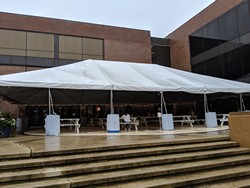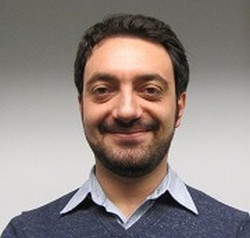The University has implemented tents with sitting areas throughout campus to help combat the COVID-19 pandemic.
The operation of ordering and administering the installation of the tents was conducted by Patti Swannack, Vice President for Administrative Services, and her division. The two most prominent tents are located in front of the Student Center and at the lawn in front of Edison Hall.
The idea for getting these tents arose through the collaboration of various task forces, including the Crisis Management Team and Fall Task Force, who are “responsible for reopening the campus in the most efficient, compliant, and safe way,” said Swannack. The installation of tents were a direct impact of the COVID-19 pandemic.
“Members of various task forces came to the same conclusion that tents were a necessary means of providing more options for classroom space, dining, and student gathering areas that were compliant with current state health guidelines that limit the use of indoor space,” said Swannack.
Several professors at Monmouth have moved their teaching outdoors, implementing the new tents as a way of holding in-person classes during the circumstances of the pandemic. Courses such as Anthropological Theory, Environmental Field Methods Lab, and General Microbiology Lab, as well as others, are currently taught outdoors under one of the new tents at the Edison building.
“It takes some creativity to adapt instruction as an instructor to move your classroom away from smartboards and computer hookups to outdoor spaces; but with some adaptability, it can be done in a lot of cases,” said Megan Delaney, Assistant Professor of the courses Ecotherapy and Research Methods which are taught outdoors at Monmouth University’s Graduate Center. She is also the author of the article, “Outdoor Learning” in Psychology Today. Although Delaney does not teach beneath one of the new tents in Monmouth University, she encourages and partakes in outdoor teaching with her classes.
Similarly, Jason Adolf, Ph.D., Endowed Associate Professor of Marine Science, teaches his Marine Biology class outdoors at the beach near campus. Dr. Adolf said that he and his class continue to wear masks at the beach and that outdoor teaching encouraged by the tents is a sensible concept. Yet, Adolf also has concerns.
“I believe it is important that while providing options, administrators give faculty the choice in how they deliver their classes. I feel safe teaching outdoors; but that might not be the case for everyone, particularly those with underlying conditions making them more susceptible to COVID-19. These are tough, unprecedented times for all and we need to balance safety and academics carefully and thoughtfully,” said Adolf.
Millineyz DeCastro, a junior health studies student, has been attending her microbiology lab class outdoors under the tent at Edison Hall. In terms of safety, she said, “The students are safely distanced, and you can’t be in the tent without a mask,” enforcing the health guidelines. As for the experience of outdoor learning, De Castro said, “When the weather is nice, it makes lab feel a bit motivating. But when the wind gets stronger and it starts to get cold or when it’s raining, it’s not the best place to be.”
Other students have used the seating areas under the tents for leisure and doing their work. Ariana Valencia, a sophomore elementary education student, is concerned with using the tent areas for working. “I think they’re a great addition, but with people sitting and eating without their masks on, I think they should be more spaced out,” she said.
Maria Monzon, a sophomore business student, has used the tents for eating. She said, “I think being outdoors can be so helpful, especially since we’re in our dorm rooms almost the entire day.” However, Monzon also added, “I wish there were more and that they would get cleaned more often. I also would really love to see the school come up with an idea so we can continue to use them during the colder months.”
The issue of the tents being ineffective during the colder seasons is spoken of by other students as well. Dustin Ho, a sophomore economics and finance student, is concerned with the tents being ineffective during the winter months. “I do not think it is resourceful if we put more funding for outdoor learning because the largest chunk of the school year is during the fall and winter,” said Ho.
Mixed opinions exist on the topic of increasing the number and funding for tents and seating areas for the future. Some, such as Ho, do not support additional funding; whereas others, including Delaney, Monzon, and Valencia, want to see further expansion. “I would love the university to invest in outdoor classroom spaces, even with smartboards and computer access. Students can BYOC (bring your own chair),” suggested Delaney.
There are also those who support a future investment in more outdoor tents and education, but only with the issue of weather being addressed and resolved. “I would like to see Monmouth expand in this sense, but weather has to be a big consideration when making that decision,” said DeCastro.
PHOTO TAKEN by Melissa Badamo




